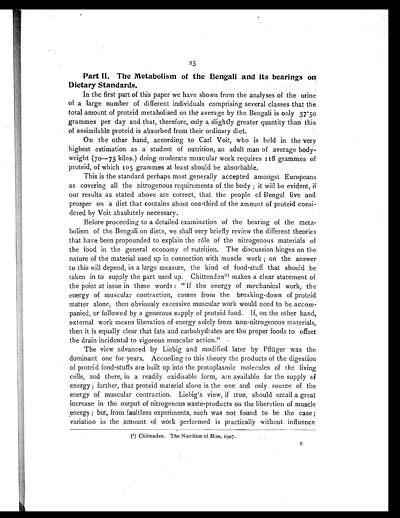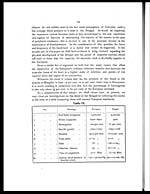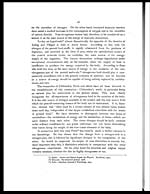Medicine - Institutions > Army health reports and medical documents > Scientific memoirs by officers of the Medical and Sanitary Departments of the Government of India > Number 34 - Standards of the constituents of the urine and blood and the bearing of the metabolism of Bengalis on the problems of nutrition > Standards of the constituents of the urine and blood and the bearing of the metabolism of Bengalis on the problems of nutrition
(33) Page 25
Download files
Individual page:
Thumbnail gallery: Grid view | List view

25
Part II. The Metabolism of the Bengali and its bearings on
Dietary Standards.
In the first part of this paper we have shown from the analyses of the urine
of a large number of different individuals comprising several classes that the
total amount of proteid metabolised on the average by the Bengali is only 37.50
grammes per day and that, therefore, only a slightly greater quantity than this
of assimilable proteid is absorbed from their ordinary diet.
On the other hand, according to Carl Voit, who is held in the very
highest estimation as a student of nutrition, an adult man of average body-
weight (70—75 kilos.) doing moderate muscular work requires 118 grammes of
proteid, of which 105 grammes at least should be absorbable.
This is the standard perhaps most generally accepted amongst Europeans
as covering all the nitrogenous requirements of the body; it will be evident, if
our results as stated above are correct, that the people of Bengal live and
prosper on a diet that contains about one-third of the amount of proteid consi-
dered by Voit absolutely necessary.
Before proceeding to a detailed examination of the bearing of the meta-
bolism of the Bengali on diets, we shall very briefly review the different theories
that have been propounded to explain the rôle of the nitrogenous materials of
the food in the general economy of nutrition. The discussion hinges on the
nature of the material used up in connection with muscle work; on the answer
to this will depend, in a large measure, the kind of food-stuff that should be
taken in to supply the part used up. Chittenden(1) makes a clear statement of
the point at issue in these words: " If the energy of mechanical work, the
energy of muscular contraction, comes from the breaking-down of proteid
matter alone, then obviously excessive muscular work would need to be accom-
panied, or followed by a generous supply of proteid food. If, on the other hand,
external work means liberation of energy solely from non-nitrogenous materials,
then it is equally clear that fats and carbohydrates are the proper foods to offset
the drain incidental to vigorous muscular action."
The view advanced by Liebig and modified later by Pflüger was the
dominant one for years. According to this theory the products of the digestion
of proteid food-stuffs are built up into the protoplasmic molecules of the living
cells, and there, in a readily oxidisable form, are available for the supply of
energy; further, that proteid material alone is the one and only source of the
energy of muscular contraction. Liebig's view, if true, should entail a great
increase in the output of nitrogenous waste-products on the liberation of muscle
energy; but, from faultless experiments, such was not found to be the case;
variation in the amount of work performed is practically without influence
(1) Chittenden. The Nutrition of Man, 1907.
E
Set display mode to: Large image | Zoom image | Transcription
Images and transcriptions on this page, including medium image downloads, may be used under the Creative Commons Attribution 4.0 International Licence unless otherwise stated. ![]()
| Permanent URL | https://digital.nls.uk/75032333 |
|---|




